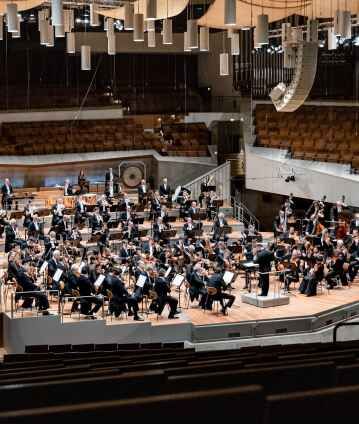Kirill Petrenko conducts Shostakovich’s Eighth Symphony

Following the performance of the Ninth Symphony at the end of October, the Berliner Philharmoniker with chief conductor Kirill Petrenko will now present Shostakovich’s Eighth, which will be broadcast from the Philharmonie Berlin without an audience. The stirring music, which was created in the middle of the Second World War, is characterised by not only sadness and despair but also by beauty and hope. Organised spontaneously for the Digital Concert Hall, the performance is intended for classical music fans from all over the world to bridge the period of closed concert halls.
Krzysztof Meyer described Dmitri Shostakovich’s Eighth Symphony, composed in the middle of the Second World War, as a “symbol of protest against evil and violence”. In 1944, the work was also heard abroad in the West – on 2 April it was conducted by Artur Rodziński in New York, and on 13 July by Sir Henry Wood in London. The noted French music critic Antoine Goléa then said that “the Eighth was dedicated to the mighty struggle for Stalingrad”, which earned the work the unofficial title “Stalingrad” by analogy with the “Leningrad” Symphony.
Shostakovich’s declared intention was a general reflection on the horrors of war: “I wanted to create, in an artistic and pictorial form, an image of the inner life of a human being who has been numbed by the gigantic hammer of war. This person goes through agonising trials and catastrophes on the way to victory. Accordingly, British critic Andrew Porter wrote in the Financial Times that Shostakovich’s work should be placed “alongside Goya and Guernica” as a “terrifying depiction” of war. The work was immediately discredited in the Soviet Union, as officials objected to the absence of the obligatory triumphal finale.
Kirill Petrenko and the Berliner Philharmoniker present here Shostakovich’s harrowing war symphony: a work that does without a final climax. What remains is only the cautious hope for peace.
© 2020 Berlin Phil Media GmbH
Related interviews
Artists
Our recommendations
- Kirill Petrenko conducts Beethoven, Brahms and Schoenberg
- Kirill Petrenko conducts Mozart, Berg and Brahms at Suntory Hall in Tokyo
- Kirill Petrenko conducts Brahms, Zimmermann and Dusapin
- Kirill Petrenko conducts Mendelssohn’s “Elijah”
- 2022 New Year’s Eve Concert with Kirill Petrenko and Jonas Kaufmann
- Kirill Petrenko conducts Tchaikovsky’s “Mazeppa”